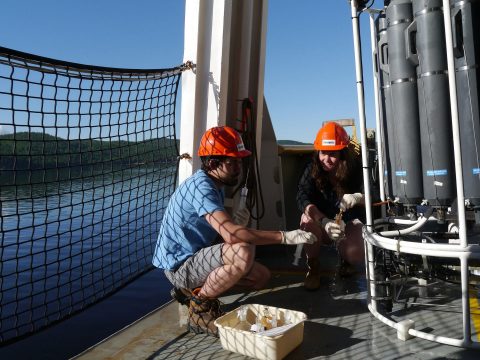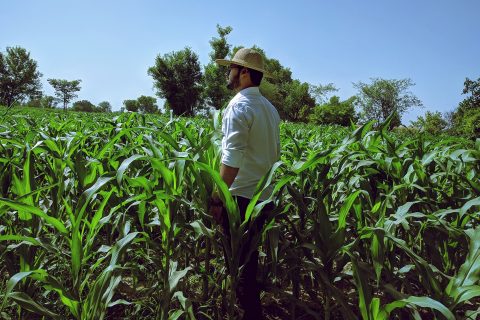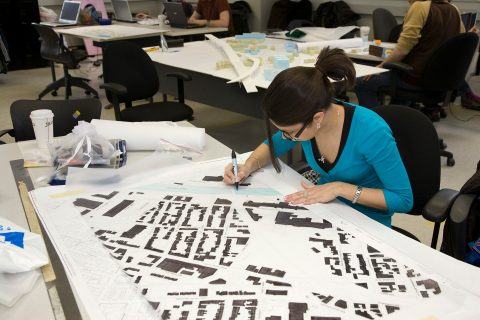Environmental Geography (BSc)
Why study Environmental Geography?
Explore the relationships between people and the landscape, whether it’s your own backyard or a vast region on the other side of the planet. As an Environmental Geography major, you’ll take courses in geography, geology and biology, and enjoy the flexibility to complement your studies in another field of interest.
Through labs, lectures and projects, you’ll acquire the analytical skills to assess the impact of human activity on natural landforms and cycles. During the program you’ll also:
- Study the causes and consequences of environmental change
- Learn to gather and interpret statistical data
- Acquire technical knowledge of computerized mapping and Geographic Information Systems (GIS)
- Learn to develop effective and efficient policies for environmental management
After graduation, your knowledge and technical skills will prepare you for a career in environmental planning, design and restoration, environmental assessment or resource management.
Special funding for out-of-province students
Up to $4000 for undergraduate programs.
Program structure
A Bachelor of Science degree takes a minimum of three or four years (90 – 120 credits) of full-time study, depending on your academic background.
Program options
- Major in Environmental Geography (45 credits)
- Minor in Environmental Geography (24 credits)
Courses
United States students: A U.S. Federal Student Aid-eligible version of this program is offered. This version meets all U.S. regulations (such as no co-operative education or e-courses) for eligible programs.
Admission criteria
Minimum cut-off averages and course requirements
- Quebec CEGEP: 23
- Admission is based on the CRC requirements indicated above and completion of the following classes as part of their DEC: Calculus 1 and Calculus 2; Mechanics, Electricity and Magnetism and Wave, Optics and Modern Physics; General Chemistry and Chemistry of Solutions; General Biology (OR Cellular Biology AND Ecology and Evolution)
- Additional information for CEGEP applicants
- High School: B- overall, B- in math / sciences
- Completed courses in the disciplines of Calculus, Biology, Chemistry and Physics.
- One math from Pre-Calculus, Calculus, or equivalent
- Two sciences (from Biology, Chemistry or Physics)
- ACT or SAT is NOT required
- Canadian curricula course requirements
- Accepted international qualifications
- Completed courses in the disciplines of Calculus, Biology, Chemistry and Physics.
- International Baccalaureate (IB) diploma: 27 overall, 4 math, 4 science
- one math (Applications and Interpretations HL, Analysis and Approaches HL or Analysis and Approaches SL)
- one science (Physics, Chemistry or Biology, either SL or HL)
- one of the math or science courses must be completed at the HL level
- International Baccalaureate Career-related Programme (CP): 4.5/7 overall, 4 math, 4 science
- one math (Applications and Interpretations HL, Analysis and Approaches HL or Analysis and Approaches SL)
- one science (Physics, Chemistry or Biology, either SL or HL)
- one of the math or science courses must be completed at the HL level
- Additional Career-related Programme (CP) course requirements
- Baccalauréat français: 12 overall, 12 in math / science
- Première: Spécialité mathématiques AND Spécialité physique-chimie
Terminale: Spécialité mathématiques (also accepted, Spécialité Physique-Chimie AND Mathématiques Complémentaires)
- Première: Spécialité mathématiques AND Spécialité physique-chimie
- British system of education (GCE):
- A-levels: At least two A-level exams CD, C in math, C in science or
- AS-levels: At least 4 AS-level exams with equivalent results or
- BTEC: Level 3 Diploma or Extended Diploma in a related subject area with equivalent results
- Students without math or science A-levels may be admissible based on AS-level or iGCSE/GCSE/O-Level exam results. Students should include all their exam results from iGCSE (or equivalent) onwards to support their application.
- Additional information for British System of Education (GCE) applicants
- University Transfers (internal/external): C+ overall, C+ in math / sciences
- Completed courses in the disciplines of Calculus, Biology, Chemistry and Physics.
Minimum cut-off averages should be used as indicators. The cut-off data may change depending on the applicant pool. Applicants who meet the stated minimum requirements are not guaranteed admission to these programs.
Application deadlines

FALL ENTRY (September)
Deadline: March 1
U.S. and international applicants: Apply no later than February 1 to allow time for immigration document processing. However, applying earlier is strongly recommended. Immigration processing times vary by country and delays could prevent you from starting your studies on time.

WINTER ENTRY (January)
Deadline: November 1
U.S. and international applicants: Apply no later than August 1 to allow time for immigration document processing. However, applying earlier is strongly recommended. Immigration processing times vary by country and delays could prevent you from starting your studies on time.
We reserve the right to close admission to a program at any time after the official deadline without prior notice.
After your degree
There is a growing demand for geographers and environmental scientists. Many employers require researchers to conduct environmental assessments for major projects. Employers also seek technical specialists in computer-assisted cartography and GIS. Environmental Geography alumni have established careers in a range of fields including:
- Environmental impact assessment
- Resource conservation
- Environmental consulting
- Geographic Information Systems analysis
- Water science
Recent graduates have become researchers with the NAFTA Commission for Environmental Cooperation and the Secretariat of the UN Convention on Biodiversity.
Student story

Faye X. Sun
Bachelor of Science
Major in Environmental Science
This program helps you understand that no issue is just about one single aspect of the environment.
Other programs of interest

If you are fascinated by the science behind how human activity affects our planet, and passionate about creating a more sustainable future, the Environmental and Sustainability Science program is for you.
Departments
Department of Geography, Planning and Environment, Department of Chemistry and Biochemistry, Department of Biology
Faculty

Explore how geography influences human behaviour and examine the impact of human activity on the environment.
Department
Department of Geography, Planning and Environment
Faculty

As an urban studies student, you’ll explore how residential and commercial areas, community spaces, public services and transportation all function together. You’ll learn how to make decisions in the public interest, and plan for future change.
Department
Department of Geography, Planning and Environment
Faculty

